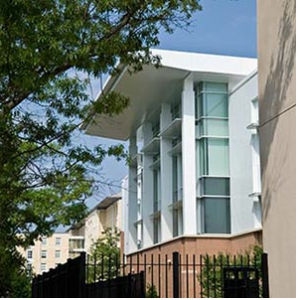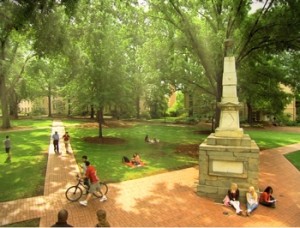At the membership meeting, John Updike Society president Jim Plath announced that the board had unanimously approved South Carolina as the site of the 4th Biennial John Updike Society Conference, which will be held October 13-15, 2016 in Columbia, hosted by The University of South Carolina and the University of South Carolina Libraries. All sessions will be held in the Ernest F. Hollings Special Collections Library, where the Don and Ellen Greiner Collection of John Updike will be showcased. It’s a modern state-of-the-art facility located at the center of campus, within easy walking distance from both conference hotels.
Don Greiner will serve as program director, and Ward Briggs as site director. Both are professors emeritus at USC, and have worked together on a previous conference.
 For the occasion, the Hollings Library will mount a major Updike exhibit that will include letters, typescripts, and galley proofs, as well as such rare and seldom seen items as inscribed copies of Updike’s Phi Beta Kappa poem, his lecture “The Future of the Novel,” and his lecture “Freedom and Equality.” Inscribed first editions and numerous rare broadsides as well as proof copies of limited signed editions will also be displayed in 14 cases. It’s not carved in stone, but the goal is to give each attendee a copy of a professionally produced catalogue of the extensive Donald and Ellen Greiner Collection of John Updike, as well as a limited edition broadside.
For the occasion, the Hollings Library will mount a major Updike exhibit that will include letters, typescripts, and galley proofs, as well as such rare and seldom seen items as inscribed copies of Updike’s Phi Beta Kappa poem, his lecture “The Future of the Novel,” and his lecture “Freedom and Equality.” Inscribed first editions and numerous rare broadsides as well as proof copies of limited signed editions will also be displayed in 14 cases. It’s not carved in stone, but the goal is to give each attendee a copy of a professionally produced catalogue of the extensive Donald and Ellen Greiner Collection of John Updike, as well as a limited edition broadside.
“At the first three conferences we celebrated the importance of place in John Updike’s literary world,” Plath said. “In South Carolina we’ll celebrate the manuscripts and books.”
Many in the society have published in other areas, and the rare book curators will welcome members who wish to engage in research either immediately prior to or following the conference. In addition to the Greiner collection, the Hollings Library holds major research collections on F. Scott Fitzgerald and Ernest Hemingway (including early books signed to each other), Joseph Heller (including the typewriter he used to write Catch-22), Ralph Waldo Emerson, Walt Whitman, Joseph Heller, John Hawkes, Frederick Busch, James Elroy, James Dickey, George V. Higgins, Elmore Leonard, Pat Conroy, Robert Burns, John Milton, and Charles Darwin. For further holdings follow this link.
Though there won’t be the usual amount of Updike sites to tour, Updike did in fact visit the University of South Carolina once—to deliver his now famous treatise “On Literary Biography.” For those who enjoy Updike’s favorite sport, Columbia is a golf mecca, and member Joseph McDade will put together a Rabbit Open best-ball scramble tournament for those who arrive early.
 The campus dates from 1801 and has an interesting history, according to Greiner. The university buildings were the only ones spared when General Sherman burned his way south—and that was because a contingency of union soldiers rode out to tell the general that the campus buildings were being used as a hospital for both sides. Once Sherman confirmed that, he left these ante-bellum structures stand and burned everything else in town.
The campus dates from 1801 and has an interesting history, according to Greiner. The university buildings were the only ones spared when General Sherman burned his way south—and that was because a contingency of union soldiers rode out to tell the general that the campus buildings were being used as a hospital for both sides. Once Sherman confirmed that, he left these ante-bellum structures stand and burned everything else in town.
The USC campus is next to a vibrant restaurant, bistro, and bar area with both upscale and more moderately priced venues. The downtown area is home to the Nickelodeon Theatre, near Columbia’s historic district, and the Columbia Museum of Art. Nearby are the Riverbanks Zoo—a nationally ranked zoo and botanical garden that’s the #1 tourist attraction of its kind in the Southeast—and Congaree National Park, the largest tract of old-growth bottomland hardwood forest remaining in the U.S.
The city of Columbia is easily accessible either by direct flights from some cities or by flights to Charlotte followed by a short commuter flight (25 min.) to Columbia, or by car rental. The Charlotte airport is the destination for international flights from around the world.
